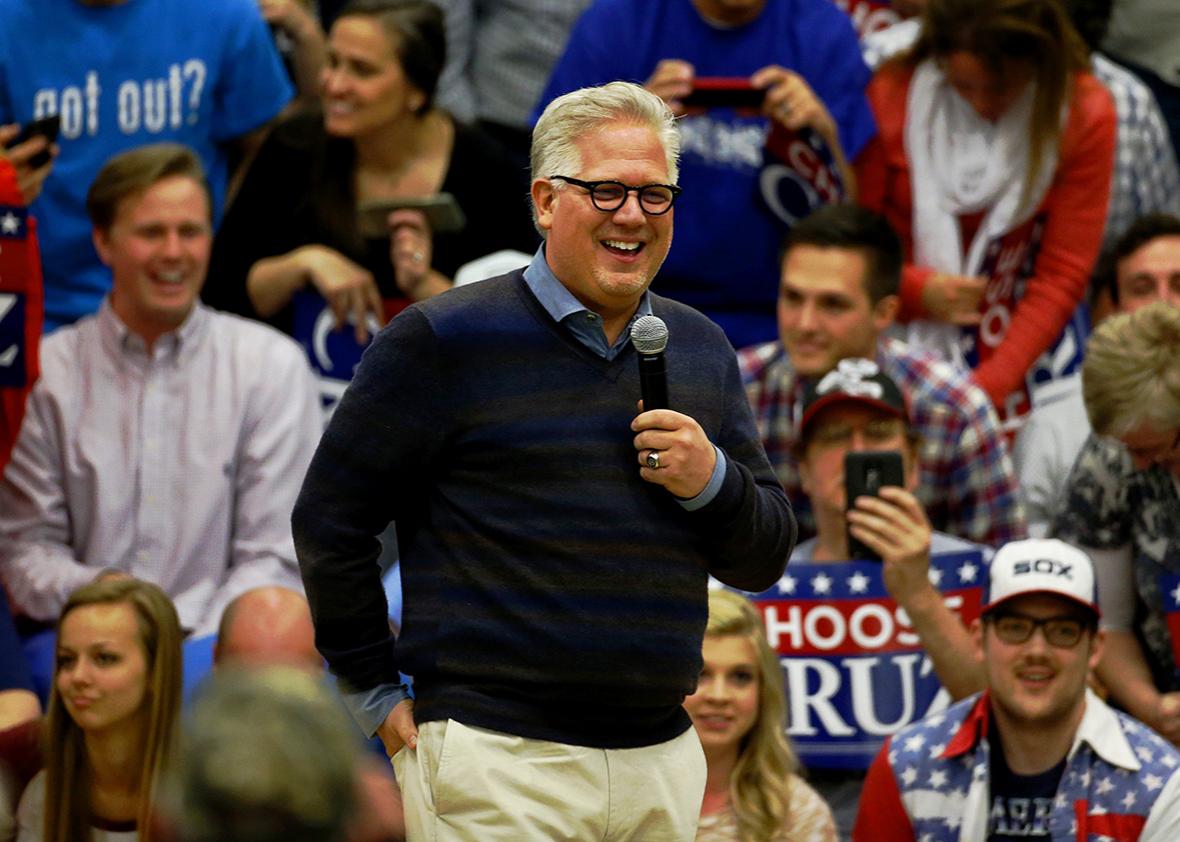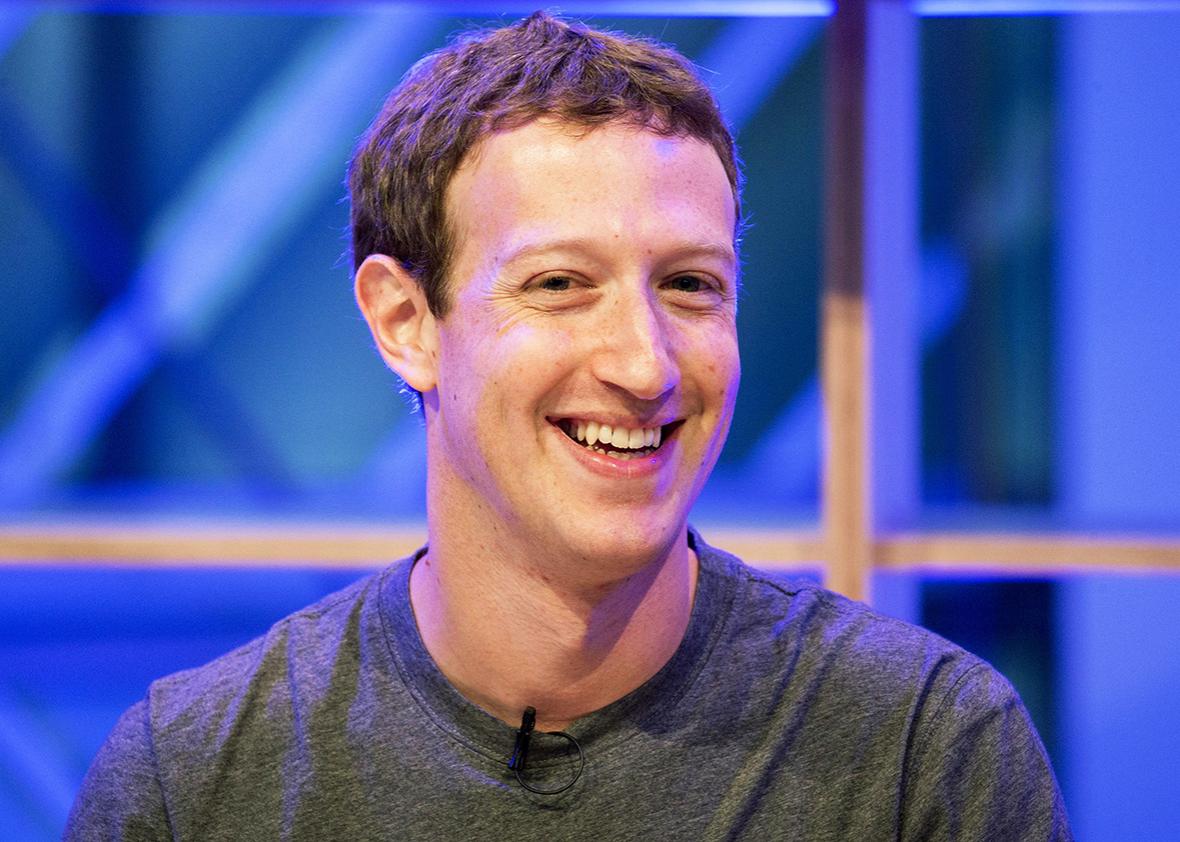Facebook is entering week two of a controversy that is, depending on how you view it, either a tempest in a teapot or a tempest in the world’s largest teapot. On Wednesday, Facebook founder and CEO Mark Zuckerberg will meet with conservative political leaders in the company’s latest attempt to contain the damage from allegations of anti-conservative bias. It’s a confusing story in which the principal players on both sides are posturing over a disagreement that largely misses the point. The following is an attempt to sift through the claims and counterclaims to reveal what’s really motivating each side, why it matters, and where it’s all likely to go from here.
Why are we here?
Great question—and surely one that Zuckerberg will be asking himself repeatedly when he’s sitting across the table from Glenn Beck, a Donald Trump aide, and other prominent conservatives on Wednesday.
We’re here, in short, because of a May 9 report in the tech blog Gizmodo that cited an anonymous former Facebook contractor accusing his ex-colleagues of anti-conservative bias in their selection of stories for the site’s “trending” news section. The claims played perfectly into the conservative narrative of liberal bias in the mainstream media, and Republican politicians wasted no time launching a pseudo-official “inquiry” into the matter.
Wait, what’s the “trending” news section?
Glad you asked, because there’s a lot of confusion about this. You know the main Facebook news feed, with all the posts from your friends and the pages you follow? Yeah, no: It’s not that. Rather, the “trending” section is that little box that appears to the right of your news feed on Facebook.com, which the majority of Facebook users no longer visit. It’s that one right below the list of birthdays and event invitations.

Screenshot via Facebook
Oh, and it’s barely visible at all in the mobile app. To find it, you’ll have to tap the search box and then scroll down past the “Recent Searches,” the “Suggested Searches,” the “Posts You May Have Missed,” and the “Random Other Crap You Don’t Care About” sections, only one of which I made up.
Why is “trending” even there?
It’s a feature that Facebook came up with in 2014 as part of its ongoing battle with Twitter to see which social media platform can make its site more like the other one. Facebook had presented trending as “a list of topics and hashtags that have recently spiked in popularity on Facebook” and implied that it was algorithmic. But it turns out that there are humans involved. Well, journalists, anyway, which in Facebook’s eyes are almost like humans. And, much like the humans they outwardly resemble, these journalists turn out to bring some political baggage to the table.
If no one reads the trending section, then why do people care so much about it?
Well, some people read the trending section, and it does drive some marginal amount of traffic to the news sites whose stories are highlighted there. Even a small fraction of Facebook users is still an awful lot of people.
That said, this isn’t really about the trending section. It’s about the disconnect between Facebook’s self-portrayal as a content-neutral technology platform and the reality that it is becoming the world’s most powerful media company. Like a traditional media company, it increasingly has the power to not only distribute the news but to shape how it’s produced and presented. It would like us to think that’s all done through the power of data and algorithms, but the truth is more complicated.
Remind me: What, specifically, are the allegations?
The allegation from the conservative ex-contractor is that fellow “curators” on the trending team routinely passed over popular stories from conservative outlets like Breitbart while elevating stories of liberal interest. For instance, the ex-curator charges that they made “Black Lives Matter” a trending topic even though it wasn’t among the most popular on the site, according to the algorithm. As Gizmodo points out, that’s noteworthy because Facebook helped to birth and fuel the Black Lives Matter movement. At least one fellow ex-curator agreed that human biases came into play in the story selection process, though everyone Gizmodo talked to denied consciously discriminating against stories based on their political interest.
What’s Facebook’s side of the story?
Frankly, it keeps changing. The company first issued a vague statement saying it takes claims of bias seriously. Then it came out with a stronger denial, maintaining that the curators were there simply to prevent duplicates and misnomers among the trending topics. Later, after the Guardian published a leaked version of Facebook’s guidelines for curators, the company admitted the curators had a broader role in story selection. But Facebook said they were constrained from personal bias by “checks and balances,” such as relying on a list of 10 major media outlets to verify newsworthiness.

George Frey/Getty Images
How did Glenn Beck get involved?
When all else failed, Facebook brought out the big guy himself. In a Thursday post on his own Facebook page, Zuckerberg said he took the claims of bias “very seriously” and promised “a full investigation,” despite finding “no evidence that this report is true.” He also pledged to meet with “leading conservatives” to try and clear the air. One of those leading conservatives, it turned out, was Glenn Beck. Another was Fox News’ Dana Perino. A top Donald Trump aide will be there, as will former South Carolina Sen. Jim DeMint. Good times will, no doubt, be had by all.
And what about that “inquiry” by House Republicans? Is that a real thing?
Sure—in the sense that political theater and grandstanding are real things. Sen. John Thune, a South Dakota Republican, wasted no time in capitalizing on the controversy by sending an official letter to Zuckerberg in his capacity as chair of the Senate Commerce Committee.* In the letter, he demanded answers to a series of questions about how the trending section works and how Facebook ensures that it’s objective.
But Facebook is a private company. Isn’t this, like, a free-speech issue?
You’d think! Especially since conservatives are always calling for the government to get out of people’s business. Thune said his committee is looking into the matter on “consumer protection” grounds, which feels like a pretty thin justification for government interference in political media.
So Facebook is pushing back, right?
Wrong! Facebook is tripping over itself to appease conservatives while continuing to insist that its trending news section is thoroughly neutral and objective.
But objectivity is a myth! There’s bias involved in every human judgment. Even algorithms have subtle human biases and value judgments built into them.
Then why is Facebook being so awkward about this?
Because the whole thing is extremely awkward for Facebook.
You see, the company probably could make the case that its trending section amounts to political speech protected by the First Amendment, and therefore the government should butt out. But Mark Zuckerberg knows that John Thune and the Senate Commerce Committee are the least of its problems.
What’s really at stake here?
What’s really at stake is Facebook’s claim to be a neutral player in politics and the media. If it’s just distributing the news according to “objective” algorithms, then no one need be too concerned about the outsize influence it wields over the global news industry and our reading habits. If, on the other hand, Facebook employees can use the service to advance their own agenda—say, to try to stop a Donald Trump presidency—then people might be right to fear its power.
Even more crucially for Facebook’s $335 billion business is its ability to appeal to people of all kinds, including conservatives. With some 1.6 billion active users, Facebook is far bigger than any political party or movement, and its ubiquity is its greatest strength as a platform. An exodus by conservatives would put that ubiquity in jeopardy. In order to reach as many users as possible, Facebook needs to be as uncontroversial as possible. That’s why it wants to preserve the notion that it’s somehow “neutral.”
OK, I think I finally get why people care about this. But is Facebook really biased against conservatives?
As a matter of policy, it almost certainly is not. Again, Facebook’s greatest interest is in keeping as many people as possible on the site as much as possible: posting photos, liking photos, clicking on links, and ultimately, viewing and buying ads. It would be wildly counterproductive for the company to jeopardize that by intentionally twisting the news feed, or even the trending section, to one political end or another. And there is zero evidence it has done that. Keeping stories from the likes of Breitbart out of “trending” until they’re confirmed elsewhere isn’t bias. It’s just the rather crude form of news judgment you get when you refuse to acknowledge that you’re exercising news judgment.
That said, Facebook is a Silicon Valley company with Silicon Valley values. Making piles of money is certainly one of those values. But Facebook has also publicly advocated for gay rights and immigration and a number of other political causes. Zuckerberg has his own pet issues, including some more compatible with conservative values, like school reform. Facebook seems to want us to believe that the values of the people who run and work for Facebook have no role in shaping the product that we all use. That seems naïve at best.
So the whole thing is overblown?
Yes—and no. The outrage over political bias in Facebook’s trending topics is overblown, although it could still have serious consequences to the extent that perceptions shape reality. But the deeper question of Facebook’s “neutrality” and its role in shaping the media is not overblown, and it’s not going away.
*Correction, May 17, 2016: This article originally misidentified Sen. John Thune as a North Dakota Republican. He is from South Dakota. (Return.)
On Wednesday, Zuckerberg will sit down with those “leading conservatives,” and they’ll probably all come away making noises about a “productive discussion” and the need for “ongoing dialogue.” Meanwhile, other conservatives will dismiss the meetings and continue railing against Facebook, saying things like “the bias runs too deep.” At some point, Facebook will probably announce some sort of changes to its trending news module so that it can assure people that the problem has been fixed. That is, if there ever really was a problem in the first place, which it will continue to assure people there wasn’t.
